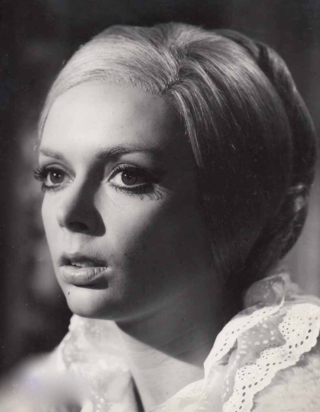This article needs additional citations for verification .(February 2022) |
| |||
|---|---|---|---|
| +... | |||
| Years in film |
|---|
 |
| 19th century |
| 1870s |
The decade of the 1960s in film involved many significant films.
This article needs additional citations for verification .(February 2022) |
| |||
|---|---|---|---|
| +... | |||
| Years in film |
|---|
 |
| 19th century |
| 1870s |
The decade of the 1960s in film involved many significant films.
Beginning in the middle of the decade due to the start of the cultural revolution and the abolition of the Hays Code (which had largely been abandoned at the start of the decade), films became increasingly experimental and daring and were taking shape of what was to define the latter half of the decade as well as the 1970s.
American International Pictures LLC is an American film production company owned by Amazon MGM Studios. In its original operating period, AIP was an independent film production and distribution company known for producing and releasing films from 1955 until 1980, a year after its acquisition by Filmways in 1979.

Sword-and-sandal, also known as peplum, is a subgenre of largely Italian-made historical, mythological, or biblical epics mostly set in the Greco-Roman antiquity or the Middle Ages. These films attempted to emulate the big-budget Hollywood historical epics of the time, such as Samson and Delilah (1949), Quo Vadis (1951), The Robe (1953), The Ten Commandments (1956), Ben-Hur (1959), Spartacus (1960), and Cleopatra (1963). These films dominated the Italian film industry from 1958 to 1965, eventually being replaced in 1965 by spaghetti Western and Eurospy films.

Jerrald King Goldsmith was an American composer, conductor and orchestrator with a career in film and television scoring that spanned nearly 50 years and over 200 productions, between 1954 and 2003. He was considered one of film music's most innovative and influential composers. He was nominated for eighteen Academy Awards, six Grammy Awards, five Primetime Emmy Awards, nine Golden Globe Awards, and four British Academy Film Awards.

Mosfilm is a film studio in Moscow which is among the largest and oldest in the Russian Federation and in Europe. Founded in 1924 in the USSR as a production unit of that nation's film monopoly, its output includes most of the more widely acclaimed Soviet-era films, ranging from works by Andrei Tarkovsky and Sergei Eisenstein, to Red Westerns, to the Akira Kurosawa co-production Dersu Uzala and War and Peace.

Elke Sommer is a German actress. She appeared in numerous films in her heyday throughout the 1960s and 1970s, including roles in The Pink Panther sequel A Shot in the Dark (1964), the Bob Hope comedy Boy, Did I Get a Wrong Number! (1966), Agatha Christie's And Then There Were None (1974), and the British Carry On series in Carry On Behind (1975).

Barbara Steele is an English actress and producer, known for starring in Italian gothic horror films of the 1960s. She has been referred to as the "Queen of All Scream Queens" and "Britain's first lady of horror". She played the dual role of Asa and Katia Vajda in Mario Bava's landmark film Black Sunday (1960), and starred in The Pit and the Pendulum (1961), The Horrible Dr. Hichcock (1962), The Long Hair of Death (1964), and Castle of Blood (1964).

Mario Bava was an Italian filmmaker who worked variously as a director, cinematographer, special effects artist and screenwriter. His low-budget genre films, known for their distinctive visual flair and stylish technical ingenuity, feature recurring themes and imagery concerning the conflict between illusion and reality, as well as the destructive capacity of human nature. Widely regarded as a pioneer of Italian genre cinema and one of the most influential auteurs of the horror film genre, he is popularly referred to as the "Master of Italian Horror" and the "Master of the Macabre".

Gary Lockwood is an American actor. Lockwood is best known for his roles as astronaut Frank Poole in the film 2001: A Space Odyssey (1968), and as Lieutenant Commander Gary Mitchell in the Star Trek second pilot episode "Where No Man Has Gone Before" (1966). He starred in the only American film by French New Wave director Jacques Demy, Model Shop. He played numerous guest television roles from the early 1960s into the mid 1990s, and played the title role in The Lieutenant (1963–1964).

William Sylvester was an American actor, chiefly known for his film and television work in the United Kingdom. A graduate of the Royal Academy of Dramatic Art, he was a star of British B-movies in the 1950s and 1960s, but gained widespread recognition for his role as Dr. Heywood Floyd in the landmark science-fiction film 2001: A Space Odyssey (1968).

Rosalba Neri is a retired Italian actress.

Brett Halsey is an American film actor, sometimes credited as Montgomery Ford. He appeared in B pictures and in European-made feature films. He originated the role of John Abbott on the soap opera The Young and the Restless.

Commedia all'italiana, or Italian-style comedy, is an Italian film genre born in Italy in the 1950s and developed in the 1960s and 1970s. It is widely considered to have started with Mario Monicelli's Big Deal on Madonna Street in 1958, and derives its name from the title of Pietro Germi's Divorce Italian Style (1961). According to most of the critics, La Terrazza (1980) by Ettore Scola is the last work considered part of the commedia all'italiana.
Thrillville is the name of a monthly theater event in Oakland, California dedicated to showcasing B-movies, cult movies, science fiction films, and exploitation films. The event features a film combined with special guests and a live stage show, typically a musical or Burlesque act. Thrillville is hosted by Will "the Thrill" Viharo and his wife, Monica "Tiki Goddess" Cortes.
Ann Smyrner was a Danish actress who was active in the 1960s in Italy, the United States, Austria and West Germany. She played in adventure, comedy, science fiction, crime, and horror movies, among which are the Sidney Pink science fiction movies Reptilicus and Journey to the Seventh Planet.

Ramana Reddy was an Indian character actor, comedian and producer known for his works predominantly in Telugu cinema. In a career spanning 24 years, he acted in more than 200 movies. Ramana Reddy and Relangi were a comedy double act during the era of early Telugu cinema.
Sally Douglas was a British supporting actress of the 1960s and 1970s. She died in September 2001 at the age of 59 from cancer.
Clodualdo del Mundo Sr. was a Filipino novelist, playwright, essayist, short story writer, journalist, screenwriter, teacher, critic. Many comics fans know him as the prolific writer of komiks through Liwayway and Ace Publications.
These are the complete works by American science-fiction writer Christopher Anvil, a pseudonym used by Harry Christopher Crosby.
The World of Hammer is a British television documentary series created and written by Robert Sidaway and Ashley Sidaway, and produced by Robert Sidaway.